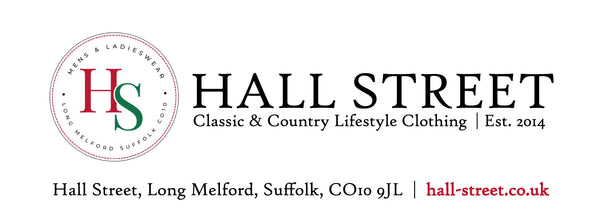Hall Street Ladies & Menswear - Integrity
integrity [noun]
The quality of being honest and having strong moral principles; moral uprightness. The state of being whole and undivided. The condition of being unified, unimpaired, or sound in construction.
Integrity: The Value We Cannot Afford to Lose
Quality. Simplicity. Trust.
These are the three core values we live by. They guide our decisions, shape our work, and define our relationships. But as I sat down to write this, I realized that there’s one word that brings all three together:
Integrity.
Integrity is the thread that binds quality to trust, and trust to simplicity. It’s the invisible structure that holds everything together—how we work, how we build relationships, and how we stay honest. And yet, integrity is a word—and a principle—that has been quietly sacrificed in today’s world.
Let me explain.
The Foundation of Every Transaction
Every economy is built on transactions. There are two sides to every exchange, and it’s the spirit in which that transaction takes place that really matters. Whether it’s a good, a service, or a simple commodity swap, what makes a transaction meaningful is the engagement—the relationship—between the parties involved.
Sales, at their best, are not about pushing products. They are about building something longer-term: mutual benefit. A shared outcome. A sense of fairness. That's where integrity lives.
But today, most transactions are engineered for volume. Suppliers, distributors, and manufacturers are driven to maximize sales while minimizing costs. That includes everything: the way they operate, the quality of materials, the treatment of workers, even the truthfulness of their marketing. And most of it, ultimately, serves shareholders—not customers.
As a result, something gets diluted. Often, it's the product. More often, it's the truth.
Where Integrity Breaks Down
The integrity of a transaction falls apart the moment trust is compromised. That could be in the form of cost-cutting disguised as “optimization.” It could be the illusion of premium quality when, in reality, the product has been hollowed out for profit.
This is where brands come in.
A brand is built on delivering value—reliability, quality, culture, identity. It reflects the desires of the people it serves. And when a brand loses its integrity, it’s because it has forgotten its original promise. Instead of serving people, it begins to serve the machine of endless growth.
This is especially true in manufacturing, where planned obsolescence is no longer a conspiracy theory but a widespread strategy. Products are deliberately made to wear out, break, or become outdated quickly. That’s not innovation. That’s manipulation.
The Digital Mirage
Now add the layer of the digital world. Transactions are no longer tactile or considered—they’re impulsive, algorithm-driven, and two-dimensional.
Marketing today is no longer about helping people buy—it’s about nudging them to consume. Screens show endless products, endlessly promoted. Social media reinforces status, aspiration, and the illusion of choice. Convenience, we’re told, is king.
But what’s convenient about ordering five versions of the same item, trying them all on, sending four back, and waiting weeks for a refund? That’s not convenience—that’s work. The consumer becomes an unpaid employee of the brand’s supply chain.
And behind every return is a massive logistical operation that comes at huge cost—not just financially, but environmentally. This is not sustainable.
The Cost of Profit at All Costs
To maximize profit, brands often manufacture where labor is cheapest. Yes, some of the world’s best textile craftsmanship exists in Asia. But much of the volume we see comes from the other end of the spectrum: low-cost, low-quality, high-turnover production.
This opens the door to manipulative pricing. With margins built on low production costs, brands can flood the market, run constant promotions, and saturate their space. But again, this is a game of perception, not value. The real cost is passed on to the consumer—who ends up buying more, more often, with less satisfaction.
Worse still, in the age of behavioral tracking and digital targeting, consumers are commoditized. Algorithms follow you. Suggest to you. Push you. Not just to buy—but to desire. The result is not loyalty. It’s addiction.
A Return to Integrity
So we return to that word: Integrity.
It’s the value most under threat in our current economy. And yet, it is the one value that can restore balance between people and brands, suppliers and customers, creators and consumers.
Integrity means:
- Making something well, even when no one is watching.
- Marketing honestly, not manipulatively.
- Building relationships, not just volume.
- Valuing people, not just shareholders.
It's not about being perfect. It’s about being principled.
We all have a choice—brands and consumers alike. The question is:
Do we want to take part in an economy of trust?
Or an economy of extraction?
Because in the end, a brand with integrity is one that lasts.
Everything else is noise.
From Sean Garnham - Owner of Hall Street Ladies & Menswear - May 2025
